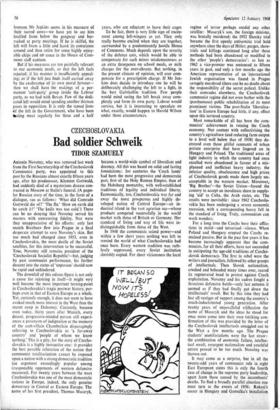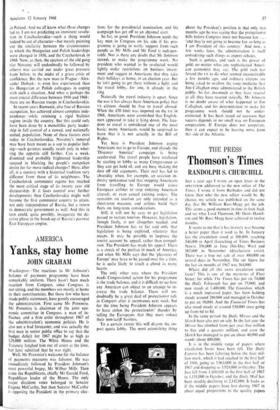Bad soldier Schweik
CZECHOSLOVAKIA TIBOR SZAMUELY
Antonin Novotny, who was removed last week from the First Secretaryship of the Czechoslovak Communist - party, was appointed to this post by the Russians almost exactly fifteen years ago, after his predecessor, Klement Gottwald, had suddenly died of a mysterious disease con- tracted in Moscow at Stalin's funeral. (A popu- lar Russian story of the time, in the form of a dialogue, ran as follows: 'What did Comrade Gottwald die of?' The flu.' How on earth did he catch it'?' The knife was too cold?) There can be no denying that Novotny served his masters with unwavering fidelity. Nor were they unappreciative of his efforts: only last month Brezhnev flew into Prague in a final desperate attempt to save Novotny's skin. But too much had changed since 1953, even in Czechoslovakia, the most docile of the Soviet satellites, for this intervention to be successful. True, Novotny still remains president of the 'Czechoslovak Socialist Republic'—but, judging by past communist performance, his further descent into the status of 'unperson' should now be rapid and unhindered.
The downfall of this odious figure is not only a .cause for rejoicing in itself—it might very well become the most important turning-point in Czechoslovakia's tragic postwar history, per- haps even in that of Eastern Europe as a whole. Yet, curiously enough, it does not seem to have evoked much more interest in the West than the recent coup in Dahomey. Curiously, because even today, thirty years after Munich, every decent, progressive-minded person still experi- ences a paroxysm of indignation at the memory of the arch-villain Chamberlain disparagingly referring to Czechoslovakia as 'a far-away country' and 'people of whom we know nothing.' This is a pity, for the story of Czecho- slovakia is a highly instructive one : it provides the best possible refutation of the notion that communist totalitarianism cannot be imposed upon a nation with a strong democratic tradition . irresponsible an argument pp ont s f western opponents e genuine xnceee di n goly potpe run d e l a rfaemn sot ng v e LE, measures). For twenty years between the wars Czechoslovakia was one of the most democratic nations democracy in Central or Eastern Europe. The name of her first president, Thomas Masaryk, became a world-wide symbol of liberalism and decency. All this was based on solid and lasting foundations: for centuries the 'Czech lands' had been the most progressive and democratic part, first of the Holy Roman Empire, then of the Habsburg monarchy, with well-established traditions of legality and individual liberty. Economically, too, Czechoslovakia was far and away the most prosperous and highly de- veloped nation of Central Europe—an in- dustrial island in the vast agrarian sea—whose products competed suctessfully in the world market with those of Britain or Germany. Her standard of living and way of life were in- distinguishable from those of the West.
In 1948 the communists seized power—and within a few short years nothing was left to remind the world of what Czechoslovakia had once been. Every western tradition was ruth- lessly suppressed, every Soviet institution slavishly copied. For sheer viciousness the local regime of terror perhaps outdid any other satellite : Masaryk's son, the foreign minister, was brutally murdered; the 1952 Slansky trial became the first openly antisetnitic trial held anywhere since the days of Hitler; purges, show- trials and killings continued long after these methods had been abandoned or modified in the other 'people's democracies': as late as 1962 a vice-premier was sentenced_ to fifteen years in gaol, and only a few months ago the American representative of an 'international Jewish organisation was found in Prague savagely murdered (there can be no doubt about the responsibility of the secret police). Unlike their comrades elsewhere, the Czechoslovak communist regime did not even bother with the (posthumous) public rehabilitation of its most prominent victims. The post-Stalin 'liberalisa- tion' in Eastern Europe had little, if any, effect upon this tortured country.
Most remarkable of all has been the com- munists' achievement in ruining the Czech economy. Not content with collectivising the country's agriculture (and reducing farm output to a level well below that of 1938) they de- stroyed even those pitiful remnants of urban private enterprise that have lingered on in.
Hungary and Poland. The traditional areas of light industry in which the country had once.
excelled were abandoned in favour of a mis- planned and inefficient heavy industry; the inferior quality, obsolescence and high prices of Czechoslovak goods made them largely un- acceptable in the western market. Moreover, 'Big Brother'—the Soviet Union—forced the country to accept an inordinate share in supply- ing 'aid' to Cuba, the Arab states, etc. The results were inevitable: since 1962 Czechoslo,- vakia has been undergoing a severe economic recession, with a corresponding heavy fall in the standard of living. Truly, communism can work wonders.
For a long time the Czechs bore their afflic- tions in stolid—and terrorised—silence. When Poland and Hungary erupted the Czechs re- mained passive. But in the past few years it has become increasingly apparent that the com- munists, for all their efforts, have not succeeded in extirpating the age-old traditions of Czecho- slovak democracy. The first to rebel were the writers and journalists, followed by other groups of intellectuals. Then Slovak nationalism, crushed and beheaded many times over, reared its regenerated head in protest against Czech; exploitation. Novotny and his cadres fought a ferocious defensive battle—only last autumn it seemed as if they had finally put down the intellectuals' revolt. But by this time they had lost all vestiges of support among the country's much-indoctrinated young generation. After twenty years of unparalleled vilification the name of Masaryk and the ideas he stood for once more come into their own (striking con- firmation of this was provided by the letter of the Czechoslovak intellectuals smuggled out to the West a few months ago. The Prague students' manifestations were the last straw: the combination of economic failure, intellec- tual revolt, resurgent nationalism and youthful unrest proved to be too much. Novotny was thrown out.
It may come as a surprise, but in all the twenty-odd years of communist rule in eight East European states this is only the fourth case of change in the supreme party leadership, apart from those caused by the incumbents' deaths. To find a broadly parallel situation one must turn to the events of 1956: Rakosi's ouster in Hungary and Gomulka's installation in Poland. And we all know what those changes led to. I am not predicting an imminent revolu- tion in Czechoslovakia—such a thing would indeed be out of character—but merely pointing out the similarity between the circumstances in which the Hungarian and Polish leaderships were changed in 1956, and the Czechoslovak in 1968. Now, as then, the ejection of the old gang (for Novotny will undoubtedly be followed by others) was carried out under great pressure from below, in the midst of a grave crisis of confidence. But the new man in Prague—Alex- ander Dubcek—is even less experienced than his Hungarian or Polish colleagues in coping with such a situation. And what is perhaps the most crucial difference between 1956 and 1968: there are no Russian troops in Czechoslovakia.
In recent years Rumania, also free of Russian occupation, has achieved almost complete inde- pendence—while retaining a rigid Stalinist regime inside the country. But this could only have been done by a monolithic party leader- ship. in full control of a cowed, and nationally united, population. None of these factors exist today in Czechoslovakia. Novotny's removal may have been meant as a sop to popular feel- ing—such gestures usually result only in whet- ting the appetite still further. Can a weak, disunited and probably frightened leadership succeed in blocking the people's outspoken desire for far more radical changes? Here, after all, is a country with a historical tradition very different from those of its neighbours. The Czechoslovak communist regime, has reached the most critical stage of its twenty year old dictatorship. If it loses control over further developments then Czechoslovakia might well become the first communist country to attain, not only independence of Russia, but a return to democratic government as well. And this in turn could, quite possibly, inaugurate the de- cisive phase iirthe break-up of Russia's postwar East European empire.































 Previous page
Previous page